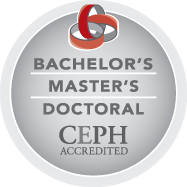Epidemiology
Master of Public Health Option
Uncover clues, discover patterns and improve population health
Applications reviewed on Dec 1 (Priority), March 1 & June 1 (Final).
Earn your MPH in epidemiology degree from Oregon State
In the MPH epidemiology program, you’ll learn how to use your skills in applied settings or prepare for doctoral or further professional training.
With small epidemiology classes and personalized attention, you’ll learn from and collaborate with our diverse and talented faculty and study a variety of factors that affect human health.
Epidemiologists seek to reduce risk by uncovering clues about what causes disease and injury so they can better detect, plan for and prevent them – here and across the globe.
Accelerated MPH program
If you are a current Oregon State undergraduate student, you can apply to the accelerated graduate program now. Start taking graduate classes and apply those credits (maximum of 22) to your current undergraduate degree, as well as the MPH in epidemiology.
Study epidemiology with the experts
In the MPH epidemiology program, you’ll learn from and collaborate with faculty who are epidemiological experts.
They study how a variety of factors affect human health, including climate change, complex chronic disease management, disease prevention and management, disaster preparedness, foodborne outbreaks, healthy aging, HIV, maternity care, and pollutants at work, at home and in the environment.

Priya Kumar, MPH ’20
Currently a research analyst II with the Division of HIV/AIDS and STD program at the Los Angeles County Department of Public Health
“My MPH degree in epidemiology was very helpful in getting my current job. The degree not only is a preferred qualification for this job, but it also has trained me in important data management and programming skills needed for my work.”
MPH curriculum and coursework
The Oregon State MPH EOH program requires 60 credit hours (about 40 semester credits), does not require a thesis and culminates with an integrative learning experience.
You’ll get hands-on experience, build professional contacts and learn from experts in the field as part of a required 200-hour professional internship. You’ll be guided along the way by a dedicated MPH internship coordinator.

See which courses you'll take as an epidemiology student.

What you'll learn as an MPH student.

How you'll apply your knowledge.
Epidemiology career options
Our MPH epidemiology graduates go on to work in various settings, such as health departments, non-governmental agencies or CDC or WHO field programs.
You’ll also be prepared to pursue a PhD in epidemiology or other professional training.
Sample careers:
- Data scientist
- Epidemiologist
- Epidemiological fellow
- Health data analyst
- Research associate

Jeff Bethel, PhD
Associate Professor
“Epidemiology is the basic science of public health.
“I think there will always be a market for those with quantitative and basic epidemiological skills – those who can look at a health problem and see how that problem is distributed in a population in terms of time and space, and then use public health tools to identify risk factors and causes to ultimately improve the population’s health.”
Affordability
Your graduate public health education is an investment in your future. We understand you must weigh the cost and benefits of your graduate education.
OSU’s MPH options are among the most reasonably priced in the Pacific Northwest.
We have reduced the tuition cost by nearly $4,000 to help address affordability and reduce barriers for the future of public health.
The Oregon State MPH participates in the Western Regional Graduate Program. You may be eligible to save about $8,000 in tuition over the course of the program.
Estimated costs
The MPH program is a 59-61 credit program that can be completed within 6 quarters on a full-time credit load (except for summer). Estimated costs for the whole program:
Resident
$31,591
Resident Tuition ($26,892)
+ Fees ($4,699)
Non-resident
$63,397
Non-resident Tuition ($58,698)
+ Fees ($4,699)
Western Regional Graduate Program
$45,037
WRGP Tuition ($40,338)
+ Fees ($4,699)
Tuition and fees estimates were calculated using the 23-24 academic year tuition and fees tables in combination with the tuition calculator. Please note, tuition and fees can change for the 24-25 academic year.
We’re here to help
For questions about the application process and requirements, contact College of Health graduate admissions.
To talk about curriculum and life as an MPH student, contact MPH Administrative Director Hanako Justice, MPH, MSW, CHES.
For academic or professional information specific to the Oregon State MPH epidemiology program, please contact Program Director Marit Bovbjerg, PhD.

Accreditation
Our BS, MPH and PhD Public Health programs are accredited by the Council on Education for Public Health. This distinction ensures your education meets the nationally-agreed-upon standards developed by public health academics and practitioners.